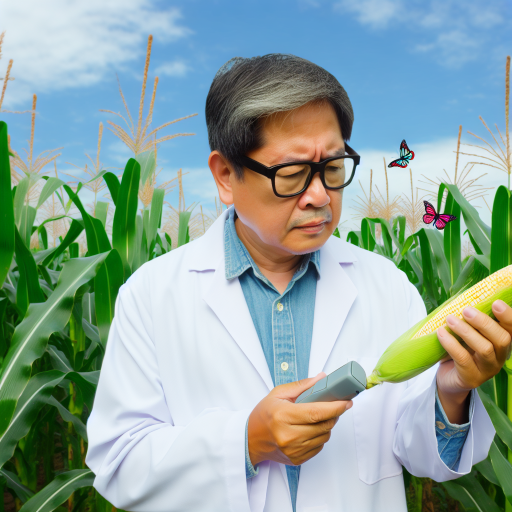Agricultural Entomology Overview
Agricultural entomology is the study of insects that affect crops and farming practices.
Understanding these insects is crucial to prevent damage and optimize crop yield.
Importance of Entomology in Agriculture
Entomology helps in identifying and managing pests that can devastate agricultural crops.
This field plays a significant role in promoting sustainable farming practices and pest control strategies.
Education and Training:
– To pursue a career in agricultural entomology, a minimum of a bachelor’s degree in entomology, biology, agriculture, or a related field is typically required.
– Many employers prefer candidates with a master’s or doctoral degree for advanced research positions or academia.
– Degree options include Bachelor of Science in Entomology, Master of Science in Agricultural Entomology, or PhD in Entomology.
– Specialized programs in entomology may focus on pest management, integrated pest management, insect physiology, or insect pathology.
– Gaining hands-on experience through internships or research opportunities is crucial for practical skills development.
– Internships with government agencies, agricultural companies, or research institutions can provide valuable field experience.
– Participating in research projects under the guidance of experienced entomologists can help build a strong foundation in the field.
– Developing skills in data analysis, experimental design, and scientific writing are essential for a successful career in agricultural entomology.
– Continuing education and professional development through workshops, conferences, and seminars is important to stay updated on the latest trends and technologies in the field.
Skills and Qualities:
When it comes to succeeding in a career in agricultural entomology, there are several essential skills and qualities that are necessary for professionals in this field.
These skills and qualities not only help individuals excel in their roles but also contribute to the overall success of their work.
Essential Skills for Success:
- Critical Thinking: Being able to analyze information and make informed decisions is crucial in agricultural entomology.
- Problem-Solving: Professionals in this field must be adept at finding solutions to complex issues related to insect pests.
- Research Skills: The ability to conduct thorough research and experiments is essential for studying insect behavior and control methods.
- Data Analysis: Professionals need to be skilled at interpreting data to make sound recommendations for pest management.
- Technical Skills: Understanding and using advanced technology and equipment is important in the field of agricultural entomology.
Importance of Attention to Detail and Communication Skills:
Attention to detail is paramount in agricultural entomology as even small oversights can have significant consequences in pest control strategies.
Professionals must be meticulous in their work to ensure accuracy and precision.
Additionally, strong communication skills are essential for professionals in agricultural entomology.
They need to effectively communicate their research findings, recommendations, and strategies to colleagues, clients, and stakeholders.
Clear and concise communication helps ensure that information is understood and implemented correctly.
Transform Your Career Today
Unlock a personalized career strategy that drives real results. Get tailored advice and a roadmap designed just for you.
Start NowNeed for Adaptability and Passion for Entomology:
Adaptability is a key quality for professionals in agricultural entomology, as the field is constantly evolving with new pests and control methods emerging.
Individuals must be willing to adapt to changing circumstances and be open to learning new techniques and technologies.
Furthermore, having a passion for entomology is crucial for success in this field.
A genuine interest in insects and their behaviors motivates professionals to delve deeper into their research and find innovative solutions to pest management challenges.
Passion drives individuals to excel in their work and make meaningful contributions to the field of agricultural entomology.
Possessing the right skills and qualities is essential for preparing for a career in agricultural entomology.
Critical thinking, problem-solving, attention to detail, communication skills, adaptability, and a passion for entomology are key attributes that can set individuals up for success in this specialized field.
You Might Also Like: Extension Agents and Precision Agriculture
Career Paths:
When considering a career in agricultural entomology, there are various paths you can take depending on your interests and skills.
Here are some career options you may consider exploring:
- Explore different career paths in agricultural entomology, such as pest management or research positions.
- Discuss opportunities for advancement and specialization within the field.
- Mention potential job settings, including government agencies, universities, and private companies.
1. Pest Management:
As an entomologist specializing in pest management, you will focus on developing strategies to control and mitigate insect pests that damage crops.
This involves conducting research to understand the behavior and lifecycle of pests, as well as implementing integrated pest management practices to minimize the use of chemical insecticides.
2. Research Positions:
If you have a passion for scientific inquiry, you may choose to pursue a research career in agricultural entomology.
This could involve working in a laboratory setting to study insect behavior, genetics, or ecology, or conducting field research to evaluate the efficacy of pest control methods.
Research positions often require a Ph.D. degree and offer the opportunity to contribute to scientific knowledge and advancements in the field.
3. Academic Institutions:
Many agricultural entomologists find employment in universities and colleges, where they may teach courses in entomology, conduct research, and work with graduate students.
Showcase Your Business Today
Reach thousands of readers actively exploring professional services. Publish your business profile and grow your audience now.
Publish NowAcademic positions provide opportunities for mentorship, collaboration with other researchers, and the ability to make a difference in the next generation of entomologists.
4. Government Agencies:
Government agencies at the local, state, and federal levels hire entomologists to assist with pest surveillance, control programs, and regulatory compliance.
Working for a government agency can provide stability, benefits, and the opportunity to have a direct impact on agricultural practices and policies.
5. Private Companies:
Private industry offers numerous opportunities for entomologists to work in research and development, product testing, consulting, or sales and marketing of pest control products.
Companies that specialize in agricultural chemicals, biological control agents, or precision farming technologies may employ entomologists to help develop innovative solutions for pest management.
6. Consulting Firms:
Entomologists with expertise in agricultural pests may choose to work as consultants, providing advice and recommendations to farmers, agribusinesses, or government agencies.
Consulting firms offer flexibility, independence, and the chance to work on a variety of projects in different regions or countries.
In terms of advancement and specialization within the field of agricultural entomology, professionals can pursue additional training, certifications, or advanced degrees to enhance their knowledge and skills.
Specialization areas may include biocontrol, insect physiology, insecticide resistance, or pest risk assessment.
A career in agricultural entomology offers a diverse range of opportunities for individuals who are passionate about insects, agriculture, and sustainable pest management practices.
By exploring different career paths, seeking out mentorship and networking opportunities, and staying current with developments in the field, aspiring entomologists can build successful and fulfilling careers in this dynamic and important field.
Learn More: Biotechnology Specialist Salary and Job Outlook
Professional Development:
Continuing education is crucial in staying updated with advancements in entomology.
Professional organizations offer valuable networking opportunities for entomologists.
Attending conferences allows for knowledge sharing and collaboration with experts in the field.
Networking with other entomologists can lead to potential research collaborations and career opportunities.
Pursuing certifications can enhance credibility and expertise in agricultural entomology.
Advanced degrees provide specialized knowledge and skills for career growth and advancement.
- Continuing education is crucial in staying updated with advancements in entomology.
- Professional organizations offer valuable networking opportunities for entomologists.
- Attending conferences allows for knowledge sharing and collaboration with experts in the field.
- Networking with other entomologists can lead to potential research collaborations and career opportunities.
- Pursuing certifications can enhance credibility and expertise in agricultural entomology.
- Advanced degrees provide specialized knowledge and skills for career growth and advancement.
You Might Also Like: Entomologists in Government Agencies: Roles and Duties

Job Outlook and Salary:
The job outlook for agricultural entomologists is positive due to the increasing demand for sustainable pest management practices.
Projected growth is expected to be around 8% in the coming years, driven by the need for effective pest control methods.
Factors influencing salary include location, with urban areas typically offering higher pay than rural settings.
Experience also plays a significant role, with seasoned entomologists commanding higher salaries due to their expertise.
A higher level of education, such as a Ph.D., can also lead to increased salary potential in this field.
Entry-level entomologists can expect to earn between $40,000 to $60,000 annually, depending on location and employer.
Experienced entomologists with several years of experience and advanced degrees can earn upwards of $80,000 to $100,000 per year.
- Entry-level salaries range from $40,000 to $60,000 annually.
- Experienced entomologists earn upwards of $80,000 to $100,000 per year.
- A higher level of education can lead to increased salary potential.
Delve into the Subject: Poultry Science: Industry Insights and Trends
Challenges in a Career in Agricultural Entomology
Dealing with pesticide resistance.
Managing invasive species.
Finding sustainable solutions to pest control.
Keeping up with rapidly evolving pest populations.
Balancing the use of chemicals with environmental impact.
Exciting Opportunities in Agricultural Entomology
Developing new pest management strategies.
Exploring the potential of biological control methods.
Studying the interactions between insects, plants, and pathogens.
Implementing integrated pest management programs.
Investigating the role of insects in ecosystem health.
Showcase Your Business Today
Reach thousands of readers actively exploring professional services. Publish your business profile and grow your audience now.
Publish NowMaking a Positive Impact on Agriculture and Food Security
Enhancing crop yields through effective pest control.
Reducing the reliance on chemical pesticides.
Protecting beneficial insects for natural pollination.
Contributing to sustainable farming practices.
Ensuring a safe and secure food supply for future generations.
Career Preparation in Agricultural Entomology
When preparing for a career in agricultural entomology, it is essential to focus on gaining relevant education and experience.
Hands-on training through internships and research opportunities can provide valuable skills for working in the field.
Networking with professionals in the industry can also open up opportunities for career advancement and mentorship.
Continuing education and staying updated on the latest research advancements will be crucial for success in this field.
Ultimately, pursuing a career in agricultural entomology can be rewarding for those passionate about insects and agriculture.
Encouraging readers to explore this field and consider how they can contribute to the sustainable management of insect pests is important.
For further exploration of entomology careers and educational opportunities, resources like the Entomological Society of America and university programs can be helpful.
Additional Resources
Entomology and Wildlife Ecology | College of Agriculture & Natural …
Department of Entomology | College of Natural & Agricultural Sciences
[E-Books for Sale]
The Big Book of 500 High-Paying Jobs in America: Unlock Your Earning Potential
$19.99 • 500 High-Paying Jobs • 330 pages
Explore 500 high-paying jobs in America and learn how to boost your career, earn more, and achieve success!
See All 500 High-Paying Jobs of this E-Book
1001 Professions Without a Degree: High-Paying American Jobs You Can Start Now
$19.99 • 1001 Professions Without a Degree • 174 pages
Discover 1001 high-paying jobs without a degree! Unlock career tips, skills, and success strategies for just $19.99!




